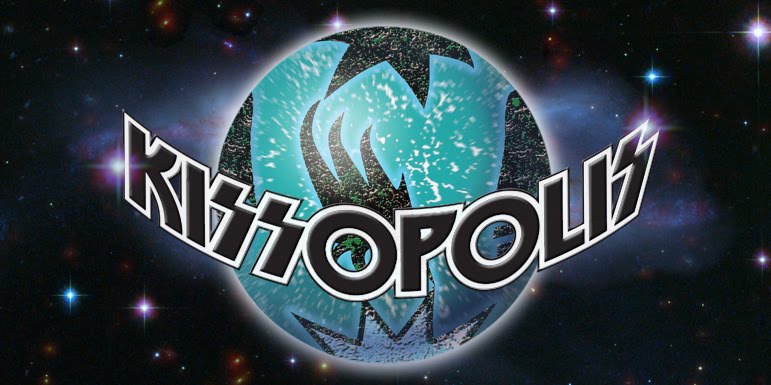By Mary Colurso
Bill Starkey doesn't paint his face, wear studded platforms or spit fake blood.
At age 52, he is unlikely to rock and roll all night, or party every day.
Yet inside this Indianapolis elementary-school teacher, there's a man who feels a deep and abiding kinship with KISS.
He's been a fan of the hard-rock band for 35 years, ever since Starkey heard the first blasts of "Deuce" coming from four glam-slam newcomers at Roberts Stadium in Evansville, Ind.
Starkey, then 18, was blown away by the sound and fury of this unknown group - for the record, it was Dec. 8, 1974, and KISS was the opening act for ZZ Top - and he vowed to spread the word to all his friends.
Little did Starkey know he'd go down in KISStory for fulfilling that promise.
He became the founder of the KISS Army, a fan club that's been essential to the group's success and embraced thousands of metal-heads.
"If that's the only thing I'm noted for when I die, it's OK with me," Starkey says in a phone interview.
Being recognized as the KISS Army's creator is an enduring badge of honor, just like the plaque Starkey received from the group in 1975, proclaiming him as an honorary member.
Today, Starkey is a respected elder statesman among the KISS crowd, asked to sign autographs, appear at expos and speak at seminars. His recollections take up several pages of a new book, "KISS Army Worldwide: The Ultimate Fanzine Phenomenon" ($22.95, Phoenix).
Starkey has a real life and an ordinary job, so he doesn't travel with the band or play a role on its tours. (He won't be in Birmingham, for example, when KISS performs on Saturday, Oct. 24, at the BJCC Arena.)
In 1976, he turned over leadership of the KISS Army to the band's professional team, and it's been out of his hands ever since.
But those old memories linger, and Starkey cherishes them. He's kept in touch with KISS over the years - the current guitarist, Tommy Thayer, is an e-mail buddy - and the band's prime movers, bassist Gene Simmons and singer Paul Stanley, never have forgotten Starkey's contributions.
"We didn't start (the KISS Army)," Simmons said in an interview with Guitar Player magazine. "It started in Terre Haute, Ind., when a radio station didn't want to play KISS. A guy named Bill Starkey kept calling to request our songs, and the DJ said, 'We don�t do that.'"
"That was it; the war was on," Starkey recalls. "I heard that the band's program director was throwing KISS' records away, saying they were a mediocre Bachman-Turner Overdrive."
To combat that attitude, the young Starkey and his friend, Jay Evans, launched an aggressive letter-writing campaign to convince the radio station in their hometown, WVTS-FM, that KISS deserved some airtime.
"Today if we did that, it would be tantamount to terrorism," Starkey says. "We'd cut out the photos we could find of KISS from magazines, like Circus or Creem, and send them with letters saying, 'Play KISS or we'll burn down the radio station.'"
According to Starkey, Evans was into a "macho military thing" at the time, and they laughingly decided to dub themselves an army of two. Starkey was the commander-in-chief; Evans was the field commander.
Eventually, WVTS succumbed to the pressure, and fulfilled the KISS Army's demands. Part of the reason, Starkey admits, was that a rival radio station had begun to spin KISS tunes and the band was finding its niche.
When KISS scheduled a tour date that year at the new arena in Terre Haute, the Hulman Center, WVTS' program director asked for more letters from the KISS Army. His bright idea: to read them on the air as a promotional tool.
"The band sold out the arena, and the only other act that had sold out was Elvis," Starkey says.
When KISS' management asked what the station had done to nudge along the sales, credit was given to an unlikely grassroots campaign.
"Yeah, some idiot kid, calls himself the KISS Army," Starkey says. "That's what they probably said."
But KISS' management took notice. Stanley and Simmons got interested in the KISS Army, and saw its potential as an official fan club. On the night of the concert, the band pulled Starkey on stage to say thank you.
"Can you imagine the feeling?" he says. "Here I'm standing in front of my hometown, holding a plaque, and they're saying that I helped KISS to sell out the arena."
No moment with KISS will ever top it, Starkey says, and he's had a few interesting ones since then.
"Thirty-five years later, the KISS Army is worldwide," Starkey says. "I never imagined it would be like this. It's gone beyond rock 'n' roll, and turned into a cultural thing. Basically, we were just two teenagers, having fun in the basement."

